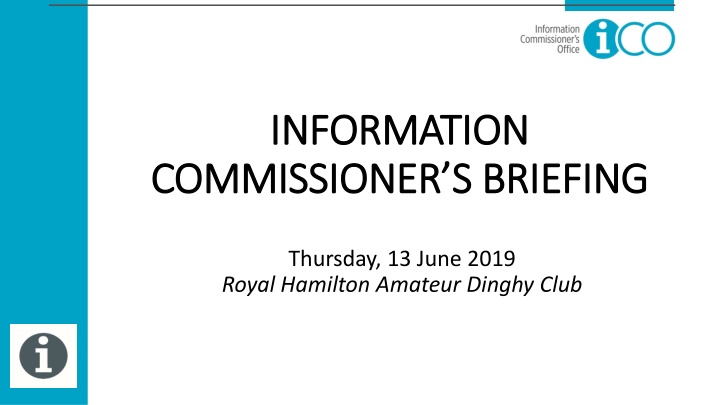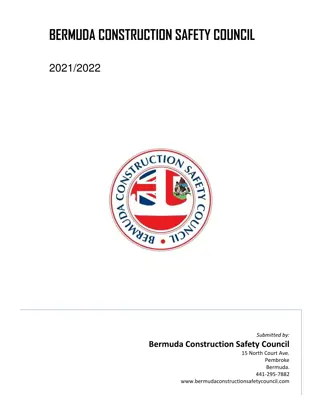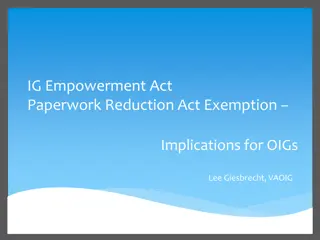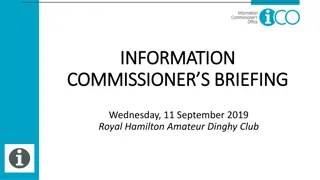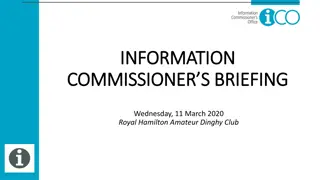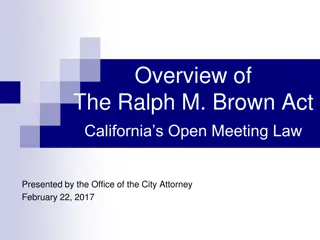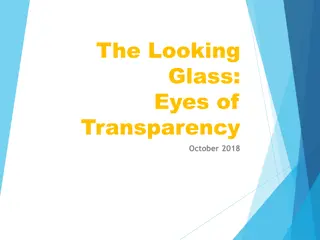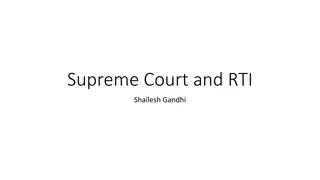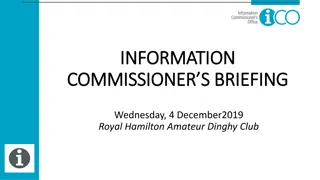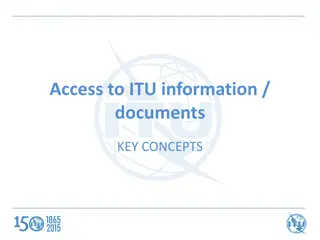Bermuda Public Access to Information Act Overview
The Bermuda Public Access to Information Act ensures transparency and accountability in government operations. It gives Bermudians and residents the right to access records held by public authorities. The Information Commissioner, an independent office, promotes this access and oversees compliance with the Act. Topics covered include the process for making a PATI request, third party notifications, and transferring requests to relevant authorities. The Act emphasizes the duty to assist and aims to keep government operations under public scrutiny.
Download Presentation

Please find below an Image/Link to download the presentation.
The content on the website is provided AS IS for your information and personal use only. It may not be sold, licensed, or shared on other websites without obtaining consent from the author.If you encounter any issues during the download, it is possible that the publisher has removed the file from their server.
You are allowed to download the files provided on this website for personal or commercial use, subject to the condition that they are used lawfully. All files are the property of their respective owners.
The content on the website is provided AS IS for your information and personal use only. It may not be sold, licensed, or shared on other websites without obtaining consent from the author.
E N D
Presentation Transcript
INFORMATION INFORMATION COMMISSIONER S BRIEFING COMMISSIONER S BRIEFING Thursday, 13 June 2019 Royal Hamilton Amateur Dinghy Club
The Public Access to Information Act The Public Access to Information Act A promise that Bermuda would be a place where government operates in the sunshine of public scrutiny .
Purposes of PATI Act (section 2) Purposes of PATI Act (section 2)
The Right to Make a PATI Request The Right to Make a PATI Request Bermudians and residents of Bermuda have the right to access records held by public authorities, unless the provisions of the PATI Act allow a public authority to deny the PATI request.
The Information Commissioner The Information Commissioner An independent public office mandated to promote public access to information.
Topics for today Topics for today Transferring a PATI request, section 13 and related provisions Third party notifications, section 39 and related provisions
When in doubt? Keep in mind the purpose of the PATI Act and the duty to assist in section 12(2)(a)
Transfer of a PATI Request Transfer of a PATI Request Section 13(5) to 13(7) and Regulation 8
Section 13(5) Section 13(5) PATI request received Authority does not hold the records Authority knows records are held by one or more other public authorities Within 5 working days of receipt of request, authority must send the request to the other public authority If more than one, send to the one whose functions are most closely related to subject matter, in the opinion of the Head of the authority
Section 13(6) and (7) Section 13(6) and (7) Head must inform requester in writing of the transfer Receiving public authority starts the process anew beginning with the acknowledgement letter Receiving authority deemed to receive request on date it received copy of the request
Regulation 8 Regulation 8 as soon as practicable , Information Officer determines whether application should be transferred (note: Act requires transfer to be done within 5 working days) Within 5 working days of transfer, Information Officer sends Head s notice of transfer, with details of new public authority, to the requester
Internal Review Internal Review section 41(1)(c) section 41(1)(c) Decision to transfer in whole or in part is subject to an internal review
BEFORE transferring, an Information Officer: BEFORE transferring, an Information Officer: Must ensure your authority does not hold the records (search or otherwise verify) Should consult with the requester before the transfer If more than one other authority holds the records, get an opinion from the Head regarding appropriate authority for transfer
BEFORE transferring, an Information Officer, cont.: BEFORE transferring, an Information Officer, cont.: Must confirm with Information Officer at the other public authority its functions and duties, as well as the likelihood of the other public authority having the relevant records, if necessary [regulation 17(h) and duty to assist, s.12(2)(a)] Then transfer within 5 working days of receipt of request
AFTER transferring, an Information Officer: AFTER transferring, an Information Officer: Must send the letter from the Head of the authority informing the requester of transfer [s.13(7) and regulation 8] Must provide the requester with the contact information for the other authority or authorities
Best Practice Guidance: Best Practice Guidance: Consult with the requester prior to the transfer to provide opportunity to agree or disagree with transfer [duty to assist, s.12(2)(a)] If original authority has records that fall within the request, it should proceed to process the PATI request
Best Practice Guidance, cont.: Best Practice Guidance, cont.: May transfer part or all of a PATI request to one or more other authorities Can separate a request into separate items or parts to send them to different public authorities
What ifs? What ifs? What if I don t realise that a PATI request needs to be transferred until the last week I am processing it? Discuss with requester immediately; transfer a copy of the request immediately If this occurs during an internal review transfer the request to correct public authority as quickly as possible
What ifs? What ifs? What if I give a copy of the request to another public authority and it refuses to take it or gives it back? This does not comply with the PATI Act Inform requester that they can seek an internal review from that public authority of the refusal to accept a request
What ifs? What ifs? What if I am the Information Officer for three different public authorities (e.g., a department and two boards) do I need to actually transfer the request if it was made to the wrong public authority but I have all of the records in my office?
What ifs? What ifs? Yes. Heads of the authorities may be different Responsible authority for the control, handling and disclosure of the record may be different With a shared Information Officer, it will not be clear which public authority made the initial decision and who should make an internal review decision. Reduces confusion for the requester and others
Third Party Third Party Notification Notification Section 39 and related provisions
Third Parties and the PATI Act Third Parties and the PATI Act Definition in s.3(1) Exemptions that trigger third party notice: s.23 (personal information) s.25 (4 commercial information exemptions) s.26 (2 information received in confidence exemptions)
Third Parties and the PATI Act Third Parties and the PATI Act Purpose: allows authorities to obtain information necessary to balance the need to provide public access to information with the need to protect rights of others
Initial Response Stage Initial Response Stage section 39 section 39 Notice requirement applies: During initial response If authority intends to disclose a record that the Head believes might contain information that is personal information (s.23), commercial information (s.25), or information received in confidence (s.26)
Initial Response Stage Initial Response Stage section 39 section 39 Notice given to any third party: Who gave the information to the authority, or To whom the information relates
Initial Response Stage Initial Response Stage section 39 Notice requirements: States intention to disclose information Describes content of record States that within 14 days from when notice is given, third party can consent or make representations in writing Cannot disclose requester s identity to third party unless requester has given written consent Copy must be given to requester section 39
Initial Response Stage Initial Response Stage section 39 section 39 Once representations are received, public authority must consider them before making decision on access. Once third party notification is made, the third party is given same rights to review as the requester.
Informal consultation may be used to obtain factual information may be phone call or conversation does not afford rights Third party notification Formal process to receive facts and arguments (representations) must be written provides third party with rights to review
Third party notification Third party notification NOT NOT required when: required when: The 3 relevant exemptions are not applicable at all - personal information (s.23), commercial information (s.25), or information received in confidence (s.26)
Third party notification Third party notification NOT NOT required when: required when: The 3 relevant exemptions are applicable and public interest requires disclosure BUT records can be withheld under different absolute exemption (no public interest test)
Third party notification Third party notification NOT NOT required when: required when: Public authority only seeks consultation with third party for factual information Requester agrees that disclosure of the information falling within s.23, s.25, or s.26 is unnecessary and will accept redaction of some or all of it
Related provisions at initial decision stage: Related provisions at initial decision stage: Extension of time (s.15) up to additional 6 weeks to consider third party s representations under section 39 Requires opinion from Head that compliance within original 6 weeks is not reasonably practicable Must give requester timely notice Extension decision subject to internal review
Initial decision Initial decision section 14 Must give notice of the decision to any third party who has made representations under section 39 Section 14 also has provisions for when access to the records must be provided ( as soon as practicable ) For commercial information or information received in confidence, should allow third party time to seek internal review before disclosure section 14
Personal information is different Personal information is different Involves balancing two rights right to access public information balanced with right to privacy PATI provisions may be affected by harmonisation with Personal Information Protection Act (PIPA) PATI Regulations 10 and 11
Personal information: Personal information: Notice to third parties Notice to third parties regulation 10 regulation 10 If access to third party personal information is intended, Information Officer must: Give notice to third party Within 5 working days of receipt of request If no response, the Information Officer must make attempts as practicable to contact third party Extension of time (s.15) available
Personal information: Personal information: Notice to third parties Notice to third parties regulation 10, cont. regulation 10, cont. Written notice must: State request has been made (without naming requester) Describe request and content of record Inform third party that within 14 working days they can consent or provide submissions Inform third party that decision on access will be made within 14 working days of date of notice or date response received
Personal information: Personal information: Notification of decision to grant access and Notification of decision to grant access and right of appeal right of appeal regulation 11 regulation 11 Once decision made to grant access in whole or in part to third party personal information: Copy of decision notice must be given to third party (remove requester s name) and Information Commissioner as soon as reasonably practicable , but Act states within six weeks of receiving requests
Personal information: Personal information: Timeframes for access to records - - regulation 11 Access to record will be given unless third party applies for internal review of decision (or Information Commissioner s review) Access to record will be deferred until a full 12 weeks after internal review decision (or failure to decide internal review) Regulation places appropriate restrictions on when it is reasonably practicable to provide access to records when personal information is involved regulation 11
Personal information: Personal information: Timeframes for access to records - - regulation 11 regulation 11 Regulation 11(2) and 11(3) only applies when internal review decision determined that: personal information exemption (s.23) applied (because information IS personal information), AND under section 23(6) disclosure is required because either balance of public interest requires it OR disclosure would benefit individual
Initial decision vs Internal review Initial decision vs Internal review Section 39 and related provisions only apply to initial decision stage Once s.39 notification given, the third party gains the right to receive notice, seek reviews, and make representations If third party notification (s.39) was unnecessary during the initial decision because records were withheld, what do you do if the internal review decision concludes the records should be disclosed?
Third parties Third parties internal review stage internal review stage Head of authority may decide to disclose additional information that falls within the personal information exemption (s.23), the commercial information exemptions (s.25), or the information received in confidence exemptions (s.26). Disagrees with public interest analysis Third parties never notified of request or given opportunity to make representations
Third party notification Third party notification internal review stage internal review stage The PATI Act does not expressly require the Head of the authority to notify any third party when conducting an internal review. section 39(4) makes reference only to section 14 (initial decision)
Third party notification Third party notification internal review stage internal review stage Head of authority must notify any third party concerned of decision this is a broader category of people than only those who received third party notice earlier under section 39
Third party notification Third party notification internal review stage internal review stage Head should consider whether in the interest of fairness, concerned third party should be: notified of the internal review, and given an opportunity to make representations If representations received, they must be considered
Additional general considerations Additional general considerations The public authority continues to have the authority and responsibility to make the decisions granting or denying access If no representations received within relevant time frame after notice provided, public authority should continue to process the request All communications with third party should safeguard requester s confidentiality unless written consent obtained
Wrap Wrap- -up up Learn more about the Information Commissioner s decisions: Decisions published on www.ico.bm Monthly Roundups highlight learning lessons ICO Guidances published on www.ico.bm General questions for ICO at 294-9181 or info@ico.bm
INFORMATION INFORMATION COMMISSIONER S BRIEFINGS COMMISSIONER S BRIEFINGS 2019-2020 Schedule Thursday, 12 September 2019 Thursday, 5 December 2019 Thursday, 12 March 2020
